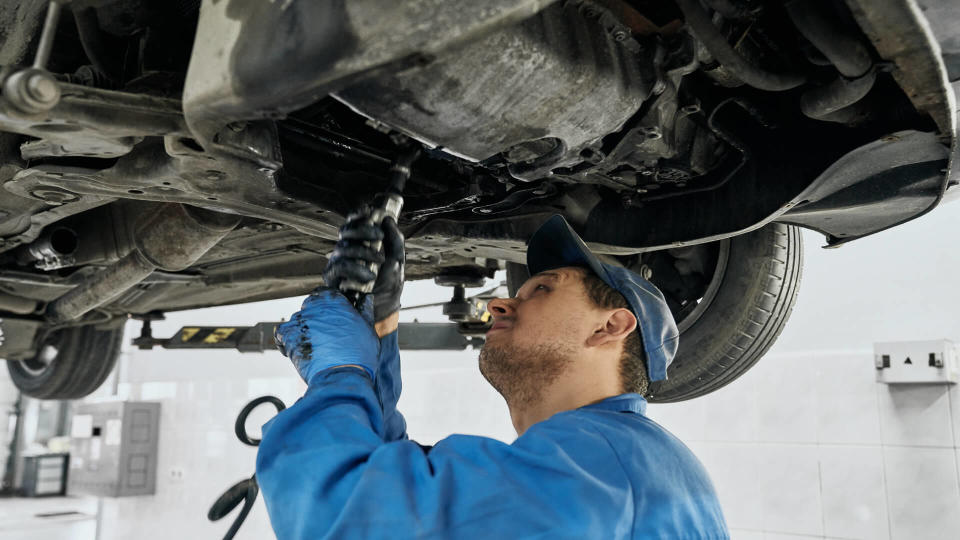
Your local auto shop or dealership makes it easy to overspend. The spaceship-like intricacies of modern vehicles are beyond the average driver’s ability to comprehend, and your mechanic knows it.
Find out: 23 things car dealers don’t want you to know
Read: How to build your savings from scratch
Repair shops and dealers are in the business of making a profit, and even if they’re not unscrupulous, it’s not always in their best interest to steer you toward a lower-cost alternative to a common problem, service, or repair, even when there is one readily available.
You can’t know every detail about every system in your car, but you can go over the most common and avoidable pitfalls.
Here’s a look at what to look out for from industry experts.
You don’t need to change your oil as often as you might think
Modern advances in oil chemistry, engine materials and fuel delivery systems have put much more distance between required oil changes. But drivers don’t always know, and repair shops are rarely willing to let them in on the secret.
“People are overpaying for oil changes because of the outdated recommendation to change the oil every 3,000 miles or so,” said Erika Gaetano of Bradley Auto Service in Red Bank, New Jersey. “Modern cars often only need an oil change every 7,500 to 10,000 miles.”
According to Car and Driver, your best bet, especially when the car is new and under warranty, is to follow the manual’s instructions, not the mechanic’s recommendation. Kelley Blue Book estimates the average oil change cost to be $35 to $75, or $65 to $125 for synthetics.
New car market: Prices are about to plummet due to oversupply
Don’t let worn brake pads turn into expensive new calipers
According to Bridgestone Tire, brake pads should last 30,000 to 35,000 miles with urban use and 80,000 or more with light use. When they go, AAA says you can expect to pay $100 to $300 per axle to replace them, or $200 to $600 for the front and rear pads.
But for many drivers, that’s just the beginning.
“This service can be overpriced due to unnecessary add-ons like caliper replacement or rotor resurfacing, which are not always necessary,” Gaetano said.
Family Handyman profiled the top scams to avoid when changing brake pads, and the report backed up Gaetano’s assessment.
He warned that buying clamps you don’t really need is the No. 1 unnecessary surcharge to avoid. Even if a caliper is faulty, it’s very likely that a cheap set of sliding pins and some lube will be all that’s needed to get it working again. If you go to have your brake pads serviced and the mechanic suggests an expensive caliper replacement or even a complete system replacement, get a second opinion.
Premium tires are rarely worth upgrading
When the penny test fails and you can see the top of Honest Abe’s head through your worn treads, you know it’s time for new tires. But since you change them so infrequently, it might be worth splurging on higher-end rubber.
Probably not.
“Sometimes people are encouraged to buy the most expensive, high-performance tires, even when their current car or driving habits don’t warrant them,” Gaetano said.
In 2018, AAA concluded a comprehensive four-year study that tested inexpensive all-weather tires against their expensive premium counterparts in the Toyota Camry and Ford F-150, the best-selling car and truck on the road.
Premium truck tires cost about $250 more for a set of four than lower-end alternatives and a little more than $200 more for the Camry.
For the most part, it was money not well spent.
The study concluded: “On average, high-priced new tires did not perform significantly better than low-priced new tires in wet stopping distance, peak lateral acceleration in a wet surface and the NVH characteristics”.
Change your transmission fluid, but politely decline a flush
Because they are notoriously expensive to fix and replace, drivers are rightly terrified of damage to their transmissions, and mechanics know it. This is why they often recommend a transmission flush instead of the standard fluid change.
My Garage Auto & Tire in Nebraska ranks streams as one of the best services you don’t need, calling it a quick and easy money maker that doesn’t address some of the most important aspects of sound streaming health, and experts are OK.
“Don’t mess with the engine or transmission,” said Lauren Fix of Car Coach Reports, who has fixed, rebuilt and raced cars throughout her career. “These techniques are often recommended for cleaning dirty engine oil or transmission fluid. They are not worth the money.”
And they are not cheap.
According to Jiffy Lube, the average flush costs $125 to $250, twice as much as a transmission fluid change. That’s because a flush uses 12 to 22 quarts of fluid, as opposed to five to seven for a change.
In Fix’s experience, basic preventive and proactive maintenance prevents you from ever needing this service.
“If you do the maintenance work recommended in your owner’s manual, you won’t have to,” he said.
More from GOBankingRates
This article originally appeared on GOBankingRates.com: I’m a mechanic: Don’t overpay for these 4 common car problems


